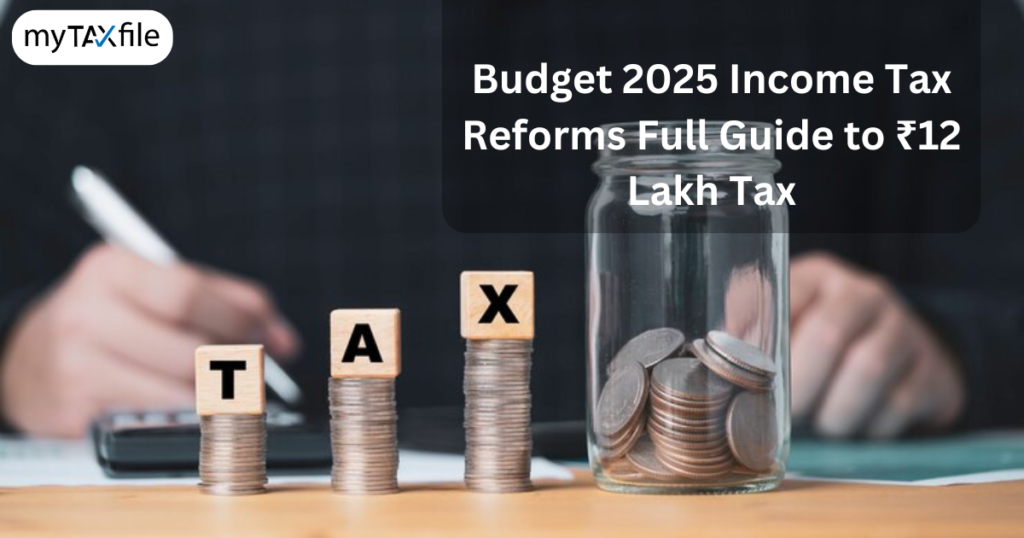The Union Budget 2025 has introduced groundbreaking changes to the income tax regime, with a focus on providing relief to middle-class taxpayers and simplifying the tax structure. One of the most talked-about proposals is the tax exemption for income up to ₹12 lakhs, which has been hailed as a game-changer for millions of taxpayers. However, this exemption comes with certain limitations, particularly for incomes taxed under special rates like capital gains. Additionally, the Budget has introduced significant benefits for senior citizens, including tax exemptions on interest income.
In this blog, we’ll break down the key highlights of Budget 2025, explore the implications of the new tax reforms, and provide practical examples to help you understand how these changes might affect you. We’ll also include diagrams and scenarios to make the information more engaging and easier to grasp.
The Big News No Tax On Income Up to ₹12 Lakhs
The most trending news from Budget 2025 is the proposed tax exemption for individuals earning up to ₹12 lakhs annually. This move is aimed at reducing the tax burden on the middle class, increasing disposable income, and stimulating economic growth. The exemption does not apply to incomes taxed under special rates:
Key Features of the ₹12 Lakh Tax Exemption
- Applicability: The exemption applies to income taxed under the normal tax slabs.
- Exclusions: It does not apply to incomes taxed under special rates, such as capital gains, dividends, or lottery winnings.
- Simplification: The new proposal simplifies the tax regime, making it easier for individuals to understand and comply with tax laws.
Why This Matters
- Increased Disposable Income: Taxpayers earning up to ₹12 lakhs will have more money in their pockets, which could lead to higher savings and spending.
- Middle-Class Welfare: This move aligns with the government’s goal of supporting middle-income households, especially in the post-pandemic economic recovery phase.
- Ease of Compliance: The simplified tax structure reduces the complexity of tax filing, encouraging more people to comply with tax laws.
Understanding the Exceptions Special Income Tax Rates
While the ₹12 lakh tax exemption is a significant relief, it’s important to note that it does not apply to incomes taxed under special rates. Here’s a breakdown of the key exceptions:
- Capital Gains
Capital gains, which arise from the sale of assets like property, stocks, or mutual funds, are taxed at different rates depending on the type of asset and the holding period. - Dividends
Dividends received from investments in stocks or mutual funds are subject to a Tax Deducted at Source (TDS) of 10% if the amount exceeds ₹5,000 in a financial year. This income is not covered under the ₹12 lakh exemption. - Lottery Winnings and Other Speculative Income
Income from lottery winnings, game shows, or speculative activities like gambling is taxed at a flat rate of 30%. This income is also excluded from the ₹12 lakh tax exemption.
Tax Exemptions for Senior Citizens
The Union Budget for 2025 has unveiled a series of significant provisions aimed at enhancing the financial well-being of senior citizens, with a particular focus on interest income. Recognizing the evolving needs of this demographic, the government has introduced measures to provide greater relief and support, ensuring that senior citizens can enjoy a more secure and comfortable retirement.
Key Changes for Senior Citizens
- Increased Exemption on Interest Income:
- The exemption limit on interest income from savings accounts, fixed deposits, and recurring deposits has been raised from ₹50,000 to ₹75,000 for senior citizens.
- For super senior citizens (aged 80 and above), the exemption limit has been increased from ₹50,000 to ₹1 lakh.
- Higher Deduction Under Section 80TTB:
- Senior citizens can now claim a deduction of up to ₹75,000 on interest income from deposits with banks and post offices.
Example
Under the updated rules for 2025, a senior citizen earning ₹1.5 lakhs in interest income from fixed deposits will see a substantial benefit. Of this ₹1.5 lakh, ₹75,000 is now exempt from tax, which means that only the remaining ₹75,000 will be subject to taxation. This change provides significant relief, allowing seniors to retain a larger portion of their interest income, ultimately supporting their financial stability and easing the burden of taxes on their hard-earned savings.
Key Takeaways from Budget 2025 on Income Tax
Here’s a concise overview of the key income tax reforms proposed in Budget 2025, a highly anticipated and crucial discussion that’s currently generating widespread attention. As the government gears up to implement these changes, taxpayers, businesses, and financial experts alike are eager to understand how these reforms will impact their finances. In this summary, we’ll highlight the most important updates that could shape the future of the tax landscape:
- Tax Exemption Up to ₹12 Lakhs: Individuals with a total income of ₹12 lakhs or less will not pay any income tax under the normal tax slabs.
- Special Tax Rates Remain Unchanged: Incomes like capital gains, dividends, and lottery winnings will continue to be taxed at their respective special rates.
- Increased Standard Deduction: The standard deduction for salaried individuals has been raised from ₹50,000 to ₹75,000.
- Enhanced Rebate Under Section 87A: The tax rebate under Section 87A has been increased, allowing individuals with income up to ₹7.5 lakhs to claim a rebate of up to ₹12,500.
- Senior Citizen Benefits: Higher exemptions on interest income and increased deductions under Section 80TTB.
How Will These Changes Impact You?
For Salaried Individuals
If you’re a salaried individual earning up to ₹12 lakhs, the new exemption introduced in Budget 2025 will be a game-changer, offering a substantial reduction in your tax liability. This reform is designed to provide much-needed relief, making a noticeable difference in your take-home income.
Examples
- Previous Tax Liability: Under the old tax regime, an individual earning ₹12 lakhs annually would have faced a tax liability of approximately ₹1.12 lakhs, even after factoring in eligible deductions. While deductions provided some relief, the overall burden still left a noticeable dent in your income.
- New Tax Liability: With the introduction of the ₹12 lakh exemption in Budget 2025, things have taken a dramatic turn. Your tax liability is now reduced to zero, meaning you won’t owe a single rupee in taxes on that ₹12 lakh income. This change effectively saves you over ₹1 lakh every year, which can be better utilized towards savings, investments, or personal goals—giving you a welcome financial boost.
For Investors
If you earn income from capital gains or dividends, it’s important to note that the ₹12 lakh exemption won’t apply to these sources of income. While this exemption offers significant relief on salaried income, other types of earnings like capital gains and dividends will still be subject to the existing tax rules.
Examples
If you earn ₹10 lakhs from salary and ₹2 lakhs from long-term capital gains, your salary income will be tax-free under the new exemption. However, the ₹2 lakhs from capital gains will still be taxed at the existing 10% rate, as the exemption doesn’t apply to this type of income.
For Senior Citizens
The increased exemption on interest income will provide significant relief for senior citizens, helping to reduce their overall tax burden and allowing them to keep more of their hard-earned money.
Example
Let’s say a senior citizen earns ₹1.5 lakhs in interest income. Thanks to the new rules, ₹75,000 of that income is exempt from tax, meaning only the remaining ₹75,000 will be subject to taxation. This gives seniors a nice break, reducing their overall tax liability.
Conclusion A Step Toward a Tax-Friendly Future
Budget 2025 has introduced groundbreaking reforms in income tax, with the ₹12 lakh exemption being the star of the show. This move is set to empower middle-class taxpayers, boost consumption, and simplify the tax filing process. However, it’s crucial to understand that this exemption does not cover incomes taxed under special rates, such as capital gains or dividends.
For senior citizens, the increased exemptions on interest income provide much-needed relief, ensuring a more comfortable retirement. By staying informed and planning strategically, taxpayers can make the most of these changes while minimizing their tax burden.
The Budget 2025 reforms are a step in the right direction, but they also underscore the importance of financial literacy and proactive tax planning. By staying ahead of the curve, you can ensure that you reap the full benefits of these changes.












